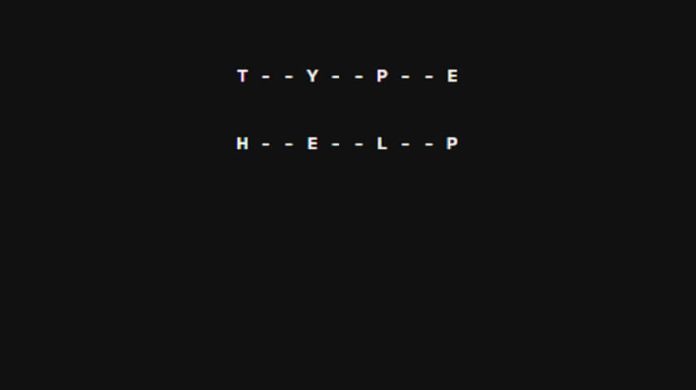There are few moments, in gaming or life, more sublime than when true understanding sets in. You’re staring at a series of seemingly unconnected muddled clods of information, splattered down on the canvas in no apparently logical or discernible order—and then, with a sudden twist of the brain, the picture comes into perfect relief. My epiphany addiction is a big reason I’m such a sucker for a good detective game—and why I’m so incredibly excited when I stumble onto a really good one that fell through the cracks upon initial release.
All of which is to say that I’m bleary-eyed and sleep-deprived as I write out this column specifically because I was up way too late last night playing William Rous’ Type Help. Rous’ freely available itch.io game, released earlier this year, has pretty much nothing in the way of bells or whistles: It’s got text, a parser, a few colored fonts, and that’s it. But it’s also one of my favorite mystery games I’ve encountered in some time, diving deep into a genre that’s been gaining welcome prominence in recent years, and which I’ve come to think of as “comprehension mysteries”: Games where the goal isn’t to solve explicit puzzles, or even catch crooks or killers, but to gain a full understanding of a complex story full of moving and complicated parts.
Type Help isn’t shy about its influences: Rous’ introduction to the game notes that he was inspired by foundational comprehension mysteries like The Return Of The Obra Dinn and, most especially, Sam Barlow’s Her Story, which helped formalize the genre. Like Her Story, Type Help is a game about coaxing a (deliberately) obtuse information archiving system into serving up scenes that slowly sketch out a story, often in non-chronological order. Rather than full-motion video, though, your unseen detective is pouring through transcripts of audio recorded from the night everyone in Galley House mysteriously died; in that sense (and in its minimalist design) the game bears a small resemblance to last year’s No Case Should Remain Unsolved. Early struggles center almost entirely around learning to navigate the game’s systems—with the first big hurdle being figuring out why file names in the fictitious computer system you’re poking around in are formatted in their very specific way. (If the thought of achieving the sort of telepathy that’s part and parcel of figuring out why the computer’s former owner used such a weird system to archive their information doesn’t tickle your brain, then our brains work very differently. I issued more happy little “hms” while diving into this stuff than I have in any game since The Roottrees Are Dead.) Once you’ve overcome that first “puzzle,” you’re off: Tracing numerous characters through the mansion, listening in on hidden conversations, and slowly building an understanding of the awful events that happened in the House.
The pleasure of the comprehension mystery—in abundant supply here—is that it frequently skips over more traditional puzzle design in favor of a more holistic need to understand. Older detective games—for instance, Capcom’s excellent but occasionally hair-pulling Ace Attorney games—often test players’ understanding by asking specific questions that have to be filled in; get out of step with the designer on even a single one, and it can constitute a roadblock. Type Help, though, encourages you to think through its overarching questions from as many different angles as possible. Finding new information often relies on keeping track of the game’s dwindling cast of characters: Who they’re talking to, as well as where and when. You can follow the breadcrumbs (if someone says they’ll be in the kitchen next, it’s generally safe to assume you can start trying to hunt down a scene of them talking to people who tend to congregate there). But you can also work backwards: If you’ve accounted for the presence of everybody except two characters in a particular block of time, there’s every chance that they’re off somewhere having a quiet chat, with finding out as simple as running a newly informed search.
This blend of inferences and deductions is thrilling; following the line of “Well, if that’s true, then…” while weeding out the game’s many red herrings—we’re told, from the jump, that “There are no ghosts in Galley House!”—produces numerous moments where confusion solidifies into suspicion and then, blissfully, into epiphany. In this sense, the game’s almost total lack of aesthetic touches is as much a boon as a deficit: Seeing a new file pop up from a carefully crafted search is a bigger explosion in the brain than any number of graphical flourishes could have been. (Although I do, personally, recommend finding some kind of ambient or classical soundtrack to play alongside the game, which lacks any traditional music of its own.)
And if “a completely graphic-free game” is too much of a hard sell for you, but you’re still intrigued by the game’s premise, you’re in luck. Last month, Rous announced that he’d been approached by Robin “Evil Trout” Ward—the same designer who took The Roottrees Are Dead from its browser-based roots and extended it to a far more polished Steam version—about giving Type Help a similar treatment. Personally, I couldn’t wait a year (the game’s due out in 2026) to play through a mystery this good, and Rous has promised that he’s writing new material for the expanded version, now titled The Incident At Galley House. But it’s great to see hidden gems like this getting this kind of remaster treatment; I’ll take a thousand projects like this one over every “We turned the framerate slightly up for the new console!” package that big-budget gaming rolls out with frustrating regularity. Really, anything that gets a mystery like this in front of more of my fellow epiphany addicts is an obvious good, in my book.
